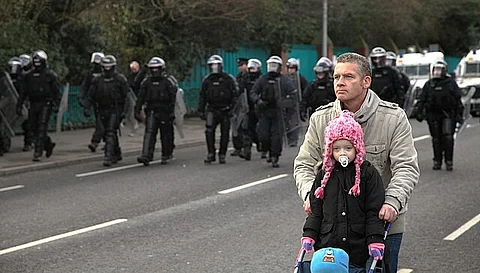

Violent unrest erupted for a second consecutive night in Ballymena, Ireland on Tuesday, with hundreds of masked rioters attacking police officers and setting homes and vehicles ablaze. The disturbances followed protests over an alleged sexual assault involving two teenage boys, who appeared in court Monday charged with attacking a teenage girl in the County Antrim town.
Rioters hurled petrol bombs, scaffolding poles, and rocks—many torn from nearby walls—at police lines. Officers in riot gear deployed armored vehicles, water cannons, and non-lethal "attenuated energy projectiles" to disperse crowds. A Reuters eyewitness described chaotic scenes: one house burned completely, while a police officer suffered smoke inhalation and vomited after exiting another targeted property. Several cars were overturned and set alight, filling the streets with flames and smoke past midnight. Calm was restored around 1:00 AM local time.
Monday’s initial violence left four homes fire-damaged and storefronts smashed. Police confirmed 15 officers were injured and are investigating the attacks as racially motivated hate crimes. Local media noted court interpreters were used during the suspects’ hearing, though the ethnic background of those involved remains unconfirmed.
Beyond Ballymena, protesters blocked roads in Belfast on Tuesday. Police also responded to sporadic disorder in Newtownabbey, Carrickfergus, and North Belfast—areas with histories of sectarian tension. The violence evoked memories of Northern Ireland’s "Troubles," though the 1998 Good Friday Agreement largely ended decades of conflict.
UK Northern Ireland Minister Hilary Benn denounced the riots on social media: "These terrible scenes have no place in Northern Ireland." Cross-community leaders echoed the sentiment, urging calm amid fears of escalating tensions. Authorities continue investigating ties between the sexual assault case and the broader unrest.